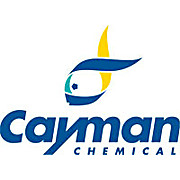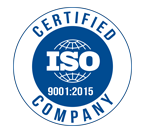Biologically Active Small Molecules
-
9,12-Octadecadiynoic Acid
Cayman ChemicalRo 3-1314 is an inhibitor of both COX and lipoxygenase. Ro 3-1314 inhibits ram seminal vesicle COX with a Ki of 0.6 µM. It is a more effective inhibitor of COX-1 than of 15-LO, inhibiting 95% and 68%, respectively, of these enzymatic activities when used at a concentration of 48 µM.
-
Nevirapine
Cayman ChemicalA non-nucleoside reverse transcriptase inhibitor that binds to viral reverse transcriptase and blocks polymerase activity by preventing RNA plus-strand initiation (IC50s = ~ 0.45 to 0.9 μM).
-
Aprotinin
Cayman ChemicalA reversible inhibitor of serine proteases such as trypsin (Ki = 0.06 pM), chymotrypsin (Ki = 9.5 nM), and kallikrein (Ki = 0.8 nM); widely used as a protein purification tool to prevent proteases present in tissue samples from degrading the protein of interest.
-
4-oxo-2-Nonenal
Cayman ChemicalA lipid peroxidation product; actively modifies histidine and lysine residues on proteins and causes protein cross-linking.
-
Lorglumide (sodium salt)
Cayman ChemicalA nonpeptidic antagonist of CCK1 (IC50 = 50 nM) that is 60-fold less effective at CCK2 (IC50 = 3 µM); blocks CCK-mediated gut muscle contraction, pancreatic growth, and pancreatic secretion; commonly used to study the roles of CCK1 in tissues and in animals.
-
(±)-Cromakalim
Cayman ChemicalAn activator of the ATP-sensitive K+ channels that displays anti-ischemic (EC25 = 8.9 μM) and cardioprotective (IC50 = 0.03 μM) effects in rat hearts.
-
MDV 3100
Cayman ChemicalA non-steroidal androgen receptor antagonist (IC50 = 36 nM); reduces the efficiency of nuclear translocation of the androgen receptor and impairs both its binding to DNA and the recruitment of coactivators.
-
Darapladib
Cayman ChemicalA reversible inhibitor of Lp-PLA2 (IC50 = 0.25 nM) that produces sustained inhibition of plasma Lp-PLA2 activity in humans.
-
6-Aminonicotinamide
LKT Labs6-Aminonicotinamide inhibits glucose-6-phosphate dehydrogenase and suppresses activity in the pentose phosphate pathway. This compound exhibits potential anticancer benefit, inducing apoptosis and inhibiting the growth of cancer cells when combined with 2-deoxy-D-glucose. In vitro,…
-
Erbstatin Analog
Cayman ChemicalA stable, potent analog of erbstatin; inhibits EGFR tyrosine kinase in vitro with an IC50 of 0.14 µg/ml; inhibits EGF-stimulated growth in NIH3T3 cells with an IC50 value of 0.5 µg/ml; delays onset of EGF-induced DNA synthesis.
-
Tetrazolium (chloride)
Cayman ChemicalA redox indicator used to detect cellular respiration; primarily reduced by Complex I in mitochondria and, under anaerobic conditions, is completely reduced to an insoluble red 1,3,5-triphenylformazan.
-
(±)-4-hydroxy Propranolol (hydrochloride)
Cayman ChemicalAn active metabolite of propranolol, inhibiting β1- and β2-adrenergic receptors with KD values of 2.4 and 5.8 nM, respectively; comparable to propranolol in potency in antagonizing the effects of isoprenaline on heart rate and blood pressure in cats and dogs.
-
Cisplatin
Cayman ChemicalA platinum-containing compound that acts as an alkylating agent; used alone or in combination therapy in the treatment of several types of cancer; inhibits the RecA recombinase of M. tuberculosis (IC50 = 2 µM), blocking protein splicing and cell growth.
-
Pentylenetetrazole
Cayman ChemicalA central nervous system modulator that is used to experimentally induce seizures in animals; used extensively to screen for compounds that block the production of nonconvulsive (absence or myoclonic) seizures.
-
Nitrocefin
Cayman ChemicalA chromogenic cephalosporin substrate commonly used to detect β-lactamases in bacteria and other microbes.
-
Coumarin hydrazine
Cayman ChemicalAn aromatic hydrazine-containing fluorophore that reacts with aldehydes or ketones for fluorescent labeling.
-
Pyridoxal isonicotinoyl hydrazone
Cayman ChemicalA lipophilic, nontoxic, iron-chelating agent that shows high iron chelation efficacy both in vitro in cell culture models and also in vivo in rats and mice.
-
T0070907
Cayman ChemicalA potent and selective PPARγ antagonist with an apparent IC50 value of 1 nM for the human receptor.
-
Oligomycin A
Cayman ChemicalAn inhibitor of mitochondrial F1FO ATP synthase that induces apoptosis in a variety of cell types (average GI50 = 270 nM); exhibits antifungal, antitumor, and nematocidal activities, but has poor solubility in water and other biocompatible solvents.
-
Adrenorphin
LKT LabsAdrenorphin is an endogenous opioid peptide produced from cleavage of proenkephalin A. Adrenorphin acts as an agonist at ?-opioid receptors (?ORs) and µ-opioid receptors (µORs). Like other opioids, adrenorphin exhibits analgesic, antinociceptive, and gastrointestinal motility modulating…
-
PIT-1
Cayman ChemicalA selective nonphosphoinositide inhibitor that specifically disrupts PIP3/Akt PH domain binding (IC50 = 31 μM); suppresses PI3K-PDK1-Akt-dependent phosphorylation, which reduces cell viability and induces apoptosis in PTEN-deficient U87MG glioblastoma cells (IC50 = 37 μM).
-
Erythromycin A enol ether
Cayman ChemicalA decomposition product of the macrolide antibiotic, erythromycin A that has been identified as a β-turn mimic of the peptide hormone motilin; used to determine the binding characteristics of ligands of the motilin receptor.
-
ß-Casomorphin, human
LKT Labsß-Casomorphin is a peptide fragment of casein that exhibits antioxidative and anti-fibrotic activities. In vivo, ß-casomorphin improves high glucose-induced changes in oxidative enzyme secretion and activity. ß-Casomorphin also decreases urinary glucose and protein levels as well as serum creatine…
-
Garcinol
Cayman ChemicalAn inhibitor of the HATs p300 and pCAF (IC50 = 7 and 5 μM, respectively) that also inhibits the HAT Gcn5; promotes neurogenesis and ex vivo expansion of human hematopoietic stem cells; induces apoptosis in several types of cancer cells and has anti-inflammatory actions.
-
SC 26196
Cayman ChemicalA selective inhibitor of Δ6 desaturase (IC50 = 0.2 µM in a rat liver microsomal assay) that completely blocks the conversion of linoleic acid to AA; orally active in vivo, decreasing edema in the carrageenan paw edema model in mice.
-
Corticosterone
Cayman ChemicalA steroid hormone produced in the cortex of the adrenal glands that binds to both glucocorticoid and mineralocorticoid receptors; also is the precursor to aldosterone synthesis.
-
Nobiletin
Cayman ChemicalA natural polymethoxylated flavonoid and potent antioxidant with good bioavailability; has anti-inflammatory effects that are relevant to a host of diseases, including cancer, arthritis, and neurodegeneration; inhibits P-glycoprotein and BCRP (IC50 = 11.5 and 4.9 μM, respectively).
-
Pyronin Y
Cayman ChemicalA fluorescent probe which stains dsRNA in living or fixed cells as well as in tissues; amenable to FC; maximum excitation is at 540-550 nm, with maximum emission at 560-580 nm.
-
Concanavalin A
Cayman ChemicalA plant lectin that selectively cross-links cell-surface glycoproteins and affects the initiation of cell agglutination, mitogenesis, and apoptosis; widely used in affinity chromatography purifications of various glycoproteins and cellular structures; also used to induce liver injury in…
-
Puromycin (hydrochloride)
Cayman ChemicalAn aminonucleoside antibiotic that blocks protein synthesis in both prokaryotes and eukaryotes by causing premature termination of nascent polypeptide chains; used in assays for peptide-bond formation and elongation and also often used as selective agent in cell culture systems.
-
Phosphoramidon (sodium salt)
Cayman ChemicalA natural and potent inhibitor of NEP and NEP2, with Ki values of 2 nM for both enzymes; also a weak inhibitor of the related zinc metalloprotease ECE (Ki = 3.5 µM); has little or no effect on a variety of other proteases.
-
Concanavalin A from Canavalia ensiformis seeds (jack beans)
MP BiomedicalsPure Canavalia ensiformis lectin (Con A) from Jackbean. Isolated by affinity chromatography on cross-linked dextran. Con A exists as a dimer below pH 5.0 and and at pH >7 it exists as a tetramer. Con-A is not a glycoprotein. The monomeric molecular weight of Con-A is 25,500. Con-A does not…

















